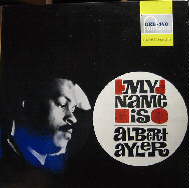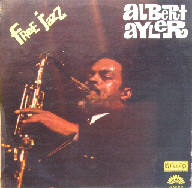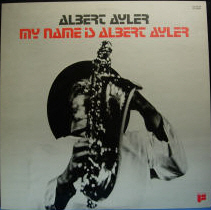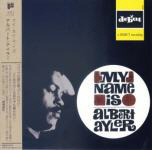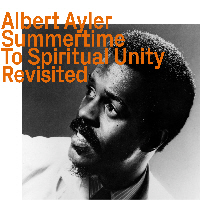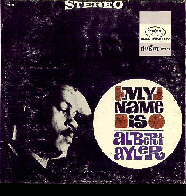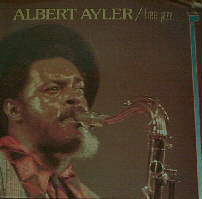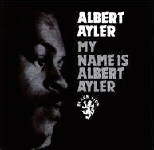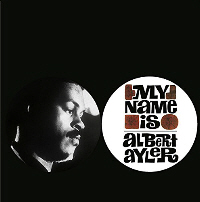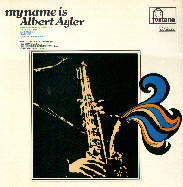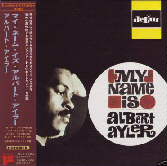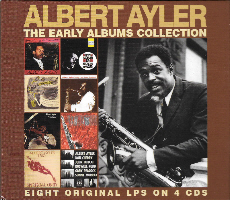|
Music Is The Healing Force Of The Universe The Inconsistency of |
|
MY NAME IS ALBERT AYLER
Tracks 1. Introduction by Albert Ayler (1:20) 2. Bye, Bye Blackbird (Dixon, Henderson) (7:30) 3. Billie`s Bounce (Parker) (6:05) 4. Summertime (Gershwin, Heyward) (9:00) 5. On Green Dolphin Street (Kaper, Washington) (9:20) 6. C.T. (Ayler) (12:20)
Personnel Albert Ayler (tenor saxophone, soprano saxophone [track 2]) Niels Bronsted (piano [tracks 2 - 5]) Niels-Henning Orsted Pedersen (bass) Ronnie Gardiner (drums)
Recording Details January 14, 1963 Studios of Danish National Radio, Copenhagen
Release Details Released as My Name is Albert Ayler or Free Jazz on Debut (Denmark) DEB140, Fantasy/Debut (USA) 86016, Fontana (UK) SFJ927, (Europe) 688.603ZL, (Japan) SFON7053, America (France) 30 AM 6100, Freedom (Japan) PA9709, King Records (Japan) K32Y 6117, Vogue (France) VG405.511016, Freedom (France) 511016, Black Lion 760211 (1996 CD release), Tokuma (Japan) TKCB-71262. Other Japanese releases: Mini LP HQCD MZCB-1213 (2010), MZCB-1275 (2013).
From the sleevenotes “Summertime was the most extraordinary recording of this session, with Ayler’s tenor at its most pathetic, gentle and caressing, so different from anything that has been heard from other tenors playing ballads.” Erik Wiedemann (from the sleevenotes of the Fontana release)
The following extract from an interview with Torben Ulrich by Lars Movin (Jazz Special, International Edition, 2003) gives some background to the origin of this recording session: “ -However, the most interesting story is about Albert Ayler and Cecil Taylor, who were supposed to play together, but that never happened. One of the most fantastic periods in the history of Jazzhouse Montmartre was when Cecil Taylor and Albert Ayler both were in town [November 1962]. In the evening, Cecil Taylor played with Sunny Murray and Jimmy Lyons, and Albert Ayler played with pianist Atli Bjørns' group for a late night show. Those were amazing times, but also very straining for the employees as well as business. Let's say that Dexter Gordon played a tune that lasted eight minutes or a quarter of an hour and then it stopped. Then the waiters could serve the tables. Cecil Taylor on the other hand, he played for around fifty minutes non stop. And on top of that, the clientele he attracted weren't really interested in drinking beer or anything else, so there wasn't much business for the waiters. -And then late at night, Albert Ayler would come along and roar with his saxophone, and that wouldn't make things much better. I especially remember one night, when Albert Ayler played well into morning. They just went on and on, and at one point, one of the waiters just couldn't take any more. Suddenly he put down his tray in front of the stage, stepped up and socked Albert Ayler and yelled, ... Shut up! ... Shut up! And Ayler was playing, only the white of his eyes showing, and he had no idea what was going on. The room went silent. And afterwards the waiter was miserable, and he hugged Albert Ayler and they cried, and it was terrible. But it goes to show what kind of pressure everyone was under, maybe the musicians too. There was a lot going on. -It went on that way for a few days with us all hanging out till morning. Albert Ayler and Sunny Murray, who played drums with Cecil Taylor, were good friends, I think they'd already played once in New York at what could be called a historic meeting. But they hadn't recorded together. And so Erik Wiedemann and I decided to make a show with the two of them playing together. As I mentioned, we made these radio shows once a week or maybe every other week, and occasionally we had a chance to invite musicians to play in the studio, either Danes with international guests or local talent. So we asked the director of the entertainment dept. if we could do something with Albert Ayler and Cecil Taylor. He mumbled a little and then he asked what it would cost. Well, it wasn't free. Cecil Taylor wanted 15.000 kroner and Albert Ayler and Sunny Murray had to be paid too. No way, and who did this jazz musician think he was anyway! Of course, if it had been Duke Ellington or Count Basie, things would have been different. But who the hell was Cecil Taylor, not to mention Albert Ayler? Eventually they let us do it anyway. It was the most expensive project we ever did. -The day of the recording came, and let's say the studio was booked for one P.M.. That meant that Sunny Murray would bring his drums from Montmartre and Cecil Taylor and Albert Ayler would arrive directly from the hotel. Naturally Erik and I were ready at one o' clock, drumming impatiently on the table, and it turned 1:15 and 1:30 and not a damn thing happened. So we called the hotel and found out that they thought we were going to pick them up. Okay, we drove over to pick them up. When we got there, Sunny Murray was there without his drums. He hadn't been over to Montmartre yet. Okay! We agreed that he would take a cab over to Montmartre and get his drums. In the meantime, the technicians were waiting. Now we had Albert Ayler and Cecil Taylor in the building, but since Sunny Murray was picking up his drums, they figured they'd get something to eat in the canteen. But when they got up there, there wasn't really anything they wanted, so they asked if there was some other place close by. In the meantime, Sunny Murray had arrived from Montmartre saying it was closed, and he couldn't find anybody with a key. So we called the owner, Herluf Kamp-Larsen, to see if someone could let Sunny Murray in to get his drums. By now it was probably two or three o'clock. And Albert Ayler and Cecil Taylor had gone across the street to a little restaurant where they could get some real food. They had ordered a couple of hamburgers from the menu, while Sunny Murray was still trying to get his drums and the time was 3:30 or 4:00. They later told us that it took the longest time to make those hamburgers, and finally the waiter came in with a big silver platter with what turned out to be pork with potatoes and vegetables [in Danish: hamburgerryg], which they didn't intend to pay for. Cecil Taylor got real mad and said they should call the police. The police arrived, and they called the radio studio saying that the police were there and this problem had to be solved. In the meantime it was 5:00 and we had the studio till 6:00. At 5:20, Sunny Murray arrived with his drums, and began setting them up. Naturally, there wasn't much time left to play, because at 6:00 everyone had to leave and there was no chance of working overtime. So we had to cancel the whole thing and send the musicians home. -Afterwards the directors were furious. That was no way to treat the State Radio. But we hadn't lost hope, we asked if we could try again the next week, because the musicians were still in town and we'd love to arrange this historical meeting. But under no circumstances would the radio pay once more, and certainly not Cecil Taylor. But since it wasn't Albert Ayler who called the police, they would accept a session with him and Danish musicians. This resulted in the record MY NAME IS ALBERT AYLER [recorded in January 1963], on which he performs Summertime and several other tunes along with Niels Brønsted and Niels-Henning Ørsted Pedersen, which is fine, but in retrospect it really would have been a historical date if we had succeeded in getting Albert Ayler and Cecil Taylor to record together. But at least we tried.”
*
|
|
Home Biography Discography The Music Archives Links What’s New Site Search
|
